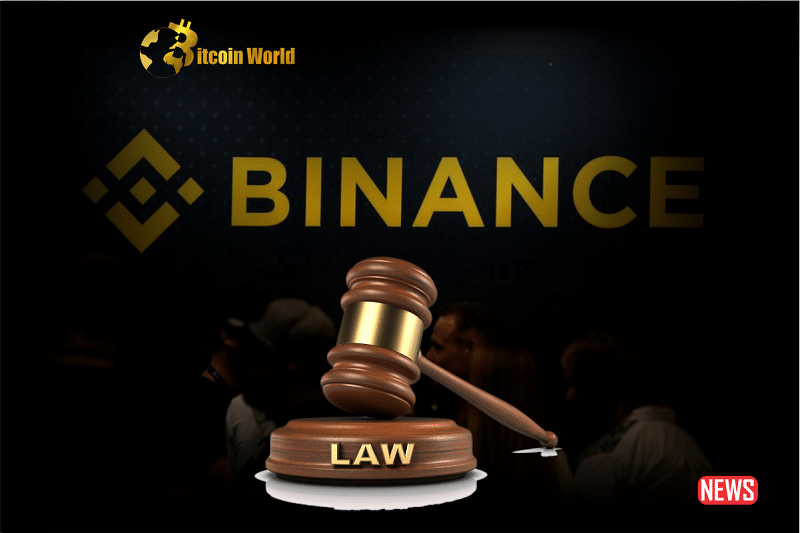The regulatory landscape for cryptocurrency is heating up, and the Securities and Exchange Commission (SEC) is at the forefront. Recently, the SEC’s lawsuit against Binance has significantly expanded the list of cryptocurrencies facing the ‘security’ classification. What does this mean for you and your crypto holdings?
What’s the Big Deal with ‘Securities’ Anyway?
For years, the SEC has been navigating the complex world of digital assets, trying to determine which tokens fall under its regulatory umbrella. The core question? Whether a cryptocurrency should be classified as a security, similar to stocks or bonds. This classification carries significant weight, impacting how these assets can be traded and managed.
The Binance Lawsuit: Adding Fuel to the Fire
The SEC’s recent action against Binance has brought this debate back into the spotlight. The lawsuit identified 10 more cryptocurrencies that the SEC considers securities, adding to a growing list. These include some well-known names in the crypto space:
- BNB
- Binance USD (BUSD)
- Solana (SOL)
- Cardano (ADA)
- Polygon (MATIC)
- Cosmos (ATOM)
- The Sandbox (SAND)
- Decentraland (MANA)
- Axie Infinity (AXS)
- COTI
A History of SEC Scrutiny: Which Cryptos Have Been Flagged Before?
This isn’t the SEC’s first foray into classifying cryptocurrencies. Several other digital assets have faced similar scrutiny in the past. Think of it as a growing body of legal precedent. Some notable examples include:
- Ripple’s XRP
- LBRY Credits (LBC)
- Algorand (ALGO)
- Terra Luna Classic (LUNC)
- TerraClassicUSD (USTC)
- Mirror Protocol (MIR)
- And 13 Mirrored Assets (mAssets)
The inclusion of Mirrored Assets, designed to track the price of traditional stocks, highlights the SEC’s concern about assets that offer exposure to traditional financial markets.
The Numbers Don’t Lie: A Significant Chunk of the Crypto Market
The SEC’s reach in the crypto space is substantial. With over 60 cryptocurrencies now labeled as securities, the agency’s regulatory scope touches over $100 billion in market capitalization. Considering the total crypto market cap hovers around $1.09 trillion, this represents roughly 10% – a significant portion!
Gensler’s Perspective: Is Everything But Bitcoin a Security?
SEC Chair Gary Gensler has made his stance quite clear, stating that “everything other than Bitcoin” could be considered a security. With over 25,500 cryptocurrencies listed on CoinMarketCap, this perspective signals a potentially vast regulatory landscape.
The Full List: A Growing Inventory of SEC-Designated Securities
For a clearer picture, here’s a more comprehensive list of cryptocurrencies the SEC has identified as securities:
- XRP
- Telegram’s Gram
- LBRY Credits
- OmiseGo
- DASH
- Algorand
- Naga
- Monolith
- IHT Real Estate
- Power Ledger
- Kromatica
- DFX Finance
- Amp
- Rally
- Rari Governance Token
- DerivaDAO
- XYO Network
- Liechtenstein Cryptoasset Exchange
- Kin
- Salt Lending
- Beaxy Token
- DragonChain
- Tron
- BitTorrent
- Terra USD
- Luna
- Mirror Protocol
- Mango
- Ducat
- Locke
- EthereumMax
- Hydro
- BitConnect
- Meta 1 Coin
- Filecoin
- BNB
- Binance USD
- Solana
- Cardano
- Polygon
- Cosmos
- The Sandbox
- Decentraland
- Axie Infinity
- COTI
- Paragon
- AirToken
And let’s not forget the Mirrored Assets tied to giants like Apple, Amazon, Tesla, and even commodities like gold and silver, further demonstrating the SEC’s broad approach.
What are the Implications? Benefits and Challenges
The SEC’s classification of cryptocurrencies as securities has significant implications for investors, exchanges, and the crypto industry as a whole.
| Aspect | Potential Benefits | Potential Challenges |
|---|---|---|
| Investor Protection | Increased transparency and regulatory oversight can offer greater protection against fraud and manipulation. | May limit access to certain tokens for some investors due to stricter regulatory requirements. |
| Market Maturity | Clearer regulations can foster institutional adoption and bring more stability to the market. | Increased compliance costs and complexities for crypto exchanges and projects. |
| Innovation | Could encourage the development of more secure and compliant crypto projects. | Potential stifling of innovation due to regulatory hurdles and uncertainty. |
| Legal Clarity | Provides a clearer framework for businesses operating in the crypto space. | Ongoing legal battles and interpretations can create confusion and uncertainty. |
Actionable Insights: What Should Crypto Holders Do?
Navigating this evolving landscape requires vigilance. Here are some actionable steps for crypto holders:
- Stay Informed: Keep up-to-date with regulatory news and announcements from the SEC and other relevant bodies.
- Diversify Your Portfolio: Consider diversifying your holdings across different types of cryptocurrencies.
- Understand the Risks: Be aware of the regulatory risks associated with specific tokens you hold.
- Consult Professionals: Seek advice from financial and legal professionals regarding your crypto investments.
- Engage in the Discussion: Participate in discussions and advocate for responsible regulation in the crypto space.
Looking Ahead: The Future of Crypto Regulation
The SEC’s increased scrutiny signals a clear direction: regulation in the cryptocurrency market is here to stay. While the long-term effects are still unfolding, it’s crucial for everyone involved – from developers to investors – to understand and adapt to this evolving environment. The classification of cryptocurrencies as securities is not just a legal matter; it has profound implications for the future of digital finance.
Disclaimer: The information provided is not trading advice, Bitcoinworld.co.in holds no liability for any investments made based on the information provided on this page. We strongly recommend independent research and/or consultation with a qualified professional before making any investment decisions.




